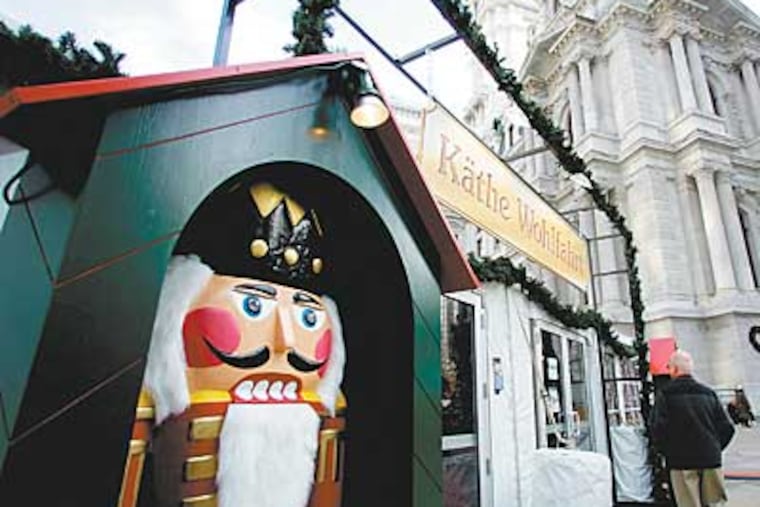Christmas village camps out at City Hall
The apron on the west side of City Hall, which hosts a farmers market in spring and summer, and occasional political demonstrations year-round, is for the first time the site of a German Christmas village.

The apron on the west side of City Hall, which hosts a farmers market in spring and summer, and occasional political demonstrations year-round, is for the first time the site of a German Christmas village.
Modeled on the traditional Christkindlmarkt in Nuremberg, the concept harks back to the 15th century, said organizer Thomas Bauer of German American Marketing Inc. Throughout Europe, and in many American cities, where an "e" is added into the name, Christkindlmarkets have become must-do activities at this time of year.
An estimated three million people visit the Christkindlmarkt in Vienna's Rathausplatz; Christkindlmarkt in Bethlehem, Pa., was named one of the top holiday markets in the world by Travel & Leisure magazine; Christkindlmarket Chicago is in its 13th year, and the market in Mifflinburg, Pa., is celebrating its 20th anniversary.
This is Philadelphia's first.
The decorated plywood huts - paid for by Bauer's group, not the city - are a bit stark. Some have Mexican-theme crafts, others sell scented candles and toy trains.
Two tents offer authentic German ornaments of wood and glass, as well as figurines, music boxes and nutcrackers. Santa and his official photographer have their own hut. And you can take your own photos of friends with the giant nutcracker outside the Kathe Wohlfahrt tent.
The food offerings are, so far, slim: Grilled bratwurst, fresh crepes and potato pancakes; packaged bakery treats such as Lebkuchen (gingerbread) and stollen; hot Bavarian pretzels topped with ham and cheese.
The more established markets traditionally feature timber huts decorated with lights and tinsel, arranged to resemble a medieval marketplace. Generally, they feature vendors selling toys and sweets, hot food and drink, Christmas ornaments, artisan crafts and one-of-a-kind gifts while choirs sing and magicians perform.
Philadelphia's market is in the beginning stages. Bauer said he envisioned the soup stall as serving goulash and potato soup. Instead it offers chili con carne, and chicken noodle and garden vegetable soup.
"We want to be authentic," Bauer said. "But a lot of people have asked us to adjust some things to local consumption habits. Also, it was hard to find a place that could safely deliver goulash. Hopefully, we can do that next year."
The event is sponsored by Lufthansa. Admission is free and the market is open from 11 a.m. through 9 p.m. daily through Christmas Eve.
Donelda LaBrake came in from Kimberton with her family.
"A high school classmate of mine lived and worked in Germany, and she used to talk about the Christkindlmarkt all the time," LaBrake said. "So when I heard it was coming to Philadelphia, I was excited. So far, this is nice. We're really here for the authentic ornaments from Germany."
Bauer's German American Marketing group approached Philadelphia officials two years ago about bringing the concept here, said Maura Kennedy of the mayor's press office.
Bauer said his group invested more than $100,000 in the project and hoped to make it a yearly event in Philadelphia.
The group paid $17,000 in rent to use the space on the apron of City Hall and in Dilworth Plaza below, Kennedy said.
A decision about whether to have Philadelphia Christkindlmarkt 2009 will be made later, Kennedy said.
Yesterday, at a stall called Kashmir Dreams, vendor Maryam Kabeer Faye was selling elaborately decorated scarves, jackets, and jewelry from around the world. A self-described Jewish-Sufi Muslim from Wynnefield, Faye said she was taken aback by the term Christkindlmarkt and references to Nuremberg.
"But the organizers are nice people," she said, "They're human beings. And after 20 years in this business, I can tell you that the point of a marketplace is to draw together a mix of people. It's a melting pot."